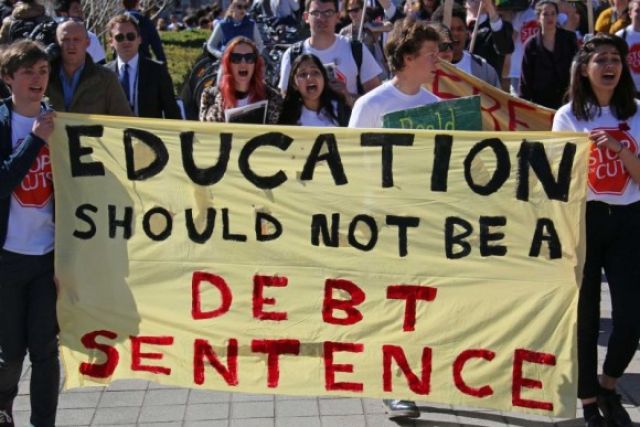
Whether it is welfare or wages, the income of youth and students seems to be under attack from the government and big business sectors.
From the beginning of this year, commencing students will no longer receive the start-up scholarship of $1025, paid in two instalments over the year. New students now have the option of applying for a start-up loan of the same amount, which, similarly to the HECS debt, will be repaid to the Australian Tax Office once their income reaches a certain level.
The current maximum youth allowance payment for students aged over 18 and enrolled in full-time study is $433.20 a fortnight. This best case scenario payment is just over half of the poverty line payment, which, according to the Australian Council of Social Service, is $400 a week for a single adult. That youth allowance is reduced if a student lives with their parents or a partner, or if they travel overseas, to name just a few examples.
This is why a number of students, despite studying fulltime, opt for the Newstart payment, usually accessed by those seeking employment. Newstart for a single adult over 25 years is $523.40 a fortnight, which is 65.42% of the poverty line. Students younger than 25 are only eligible for Youth Allowance regardless of whether they are studying or seeking employment.
Currently the Social Security Legislation Amendment (Further Strengthening Job Seeker Compliance) Bill 2015 is before parliament. It will give the employment services industry new powers to financially penalise the unemployed. This includes a 10% fine of the payment for “inappropriate behaviour” which is vaguely defined as acting in a manner “such that the purpose of the appointment is not achieved”.
Penalty rates under attack
Working young people have a slightly better deal. The $17.29 an hour minimum wage works out to $656.90 before tax for a 38-hour week. However, a 38-hour week is not at all common for young workers. Most young workers are employed in highly casualised industries such as hospitality and retail, where more often than not they rely on penalty rates to pay the bills.
Penalty rates are under constant attack from the federal government, big business and even the Shop Distributive and Allied Employees' Association, which, instead of defending workers' pay and conditions, agreed to an Enterprise Bargaining Agreement in South Australia that cut penalty rates and left workers worse off financially.
In December last year the national average for youth unemployment was 14.2%. However, across the country there are a number of unemployment hotspots, including suburbs in Cairns, Adelaide, Melbourne, Sydney and Hobart, where the unemployment rate reaches over 20%.
Demands worth fighting for
Resistance: Young Socialist Alliance stands for free education for all. As a wealthy nation, Australia is more than capable of following in the footsteps of Germany, Chile, Venezuela, Denmark, Finland, Norway and Sweden and introducing free education.
It is not so much a question of where the money will come from, as to where the money is going now. Most goes to military spending — $36 billion for 12 submarines — and subsidising big businesses, who in return pay very little tax.
Transfield, now renamed Broadspectrum, and Chevron paid no tax in the 2013-2014 financial year, while Fairfax Media, News Australia, Macquarie Bank and others paid a minimal amount of tax despite profits in the billions.
Taxing the corporate rich, so that students do not need to start their lives with thousands of dollars of debt just to get a basic education, would start to balance the scales.
Increasing Newstart, Youth Allowance, ABStudy and AUStudy to a living wage so students can support themselves while studying, would be another step in the right direction.
In a study done by Universities Australia in 2012, half of the survey participants reported that their employment adversely affected their performance at university; 1 in 3 domestic students and 1 in 6 international students reported regularly missing classes because they had to work.
Youth unemployment and underemployment is a structural problem of the capitalist economy. The percentage of unemployed young people sits at about double the rate of the rest of the population at any given time. Those young people who can find work are mostly employed in casual, insecure and low-paid jobs. These factors ensure that young people are less likely to look for work and have a major impact on young people's standard of living and ability to afford basic necessities.
If the market is unable to provide young people with work and a living wage, the government should step in and provide socially useful jobs for young people with full pay.
For example, the biggest problem we face is the climate crisis. The government should implement a sustainability plan that creates jobs to meet the needs of communities and makes a habitable planet possible.
Resistance also stands for an end to youth pay rates. Youth wages mean that young people get paid less for doing the same work as someone older. The minimum wage should be a minimum wage for all, not further reduced due to age, traineeship or apprenticeship status.
The National Union of Students (NUS) should be actively campaigning on these issues for students and youth. But instead it is caught up in a scandal of misspending $200,000 of student money.
If NUS is incapable of advocating for students on these issues, then it falls to students to organise themselves in democratic grassroots movements to defeat the welfare and wage attacks that will make day-to-day living even harder for young people.
Like the article? Subscribe to Green Left now! You can also like us on Facebook and follow us on Twitter.